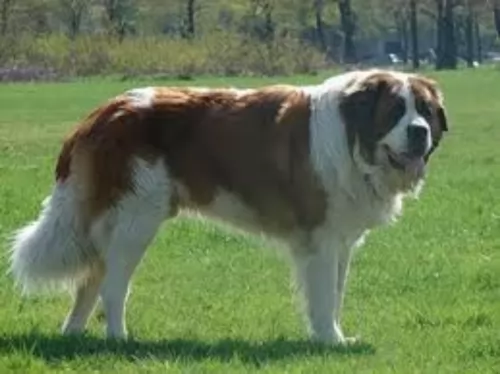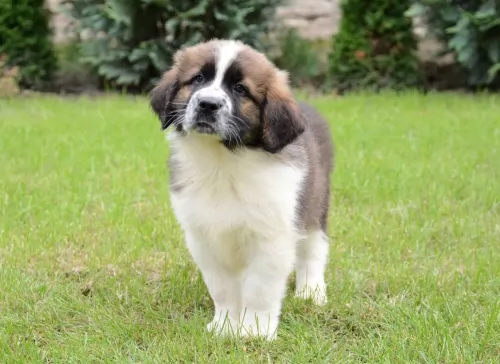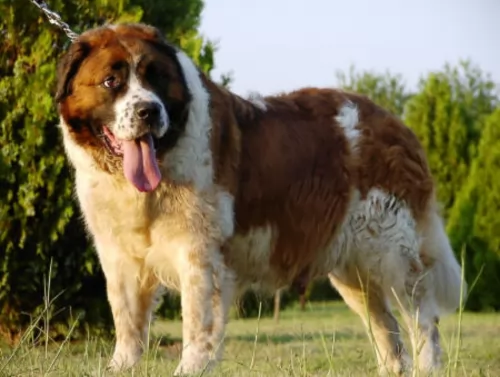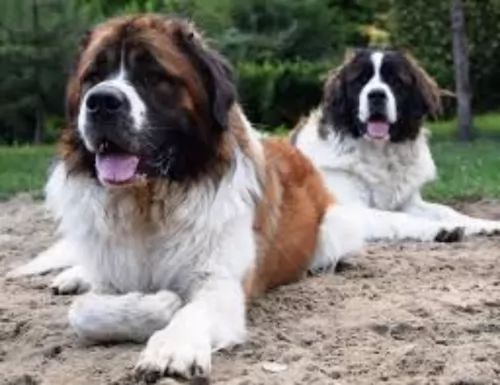 Petzlover
Petzlover Moscow Watchdog is originated from Russia but Olde English Bulldogge is originated from United States. Moscow Watchdog may grow 18 cm / 8 inches higher than Olde English Bulldogge. Moscow Watchdog may weigh 32 kg / 71 pounds more than Olde English Bulldogge. Moscow Watchdog may live 3 years less than Olde English Bulldogge. Both Moscow Watchdog and Olde English Bulldogge has same litter size. Moscow Watchdog requires Moderate Maintenance. But Olde English Bulldogge requires Low Maintenance
Moscow Watchdog is originated from Russia but Olde English Bulldogge is originated from United States. Moscow Watchdog may grow 18 cm / 8 inches higher than Olde English Bulldogge. Moscow Watchdog may weigh 32 kg / 71 pounds more than Olde English Bulldogge. Moscow Watchdog may live 3 years less than Olde English Bulldogge. Both Moscow Watchdog and Olde English Bulldogge has same litter size. Moscow Watchdog requires Moderate Maintenance. But Olde English Bulldogge requires Low Maintenance
 The Moscow Watchdog is a cross between the Caucasian Oytcharka, the St. Bernard and other Russian hound dogs. This large breed dog was developed in the Soviet Union for the purpose of being guard dogs. It had the awareness and assertiveness of the Oytcharka and the size, intelligence and attractiveness of the St. Bernard. The breed is common in Russia today but hardly seen anywhere else even though they were exported to the United States and Europe. The breed had the first U.S. born litter in 2015 and it is not AKC recognized.
The Moscow Watchdog is a cross between the Caucasian Oytcharka, the St. Bernard and other Russian hound dogs. This large breed dog was developed in the Soviet Union for the purpose of being guard dogs. It had the awareness and assertiveness of the Oytcharka and the size, intelligence and attractiveness of the St. Bernard. The breed is common in Russia today but hardly seen anywhere else even though they were exported to the United States and Europe. The breed had the first U.S. born litter in 2015 and it is not AKC recognized.
Following the second world war crime was on the rise in the Soviet Union and a new breed of dog was needed to counter this trend. The dog had to be adaptable to very cold temperatures, snowy weather and have a guard dog personality and ability. The breed was called on to guard such locations as railroads, government offices, warehouses, infrastructure and labor camps.
The project to develop this breed was led by General Medvedev beginning in 1946 at the Central School of Military Kynology – which was a department of the Soviet Ministry of Defense. It took many years to develop the Moscow Watchdog which then became a very successful breed.
It took until 1985 for the breed to be “officially” recognized in the Soviet Union and until 1992 to be recognized by the Federation of Dog Breeders in Russia and until 1997 for the standard to be approved by the Russian Kennel Club. They are still working with the FCI to gain international recognition for the breed. At the moment they are considered a part of the Molosser group and shown in the “Special Show” in Russia.
Committed breeders brought the Moscow Watchdog to Hungary in 1986 in order to make the breed more popular. In addition to this there were many breeders from previous Soviet States that wanted to preserve the breed as well. There were about 500 Moscow Watchdogs in Hungary around then. Currently there are about 27 Moscow Watchdogs in the United States. The breed is known to be a gentle giant and very much a family dog these days.
 The Bulldog in general has undergone quite a few changes over the years and the Olde English Bulldogge was developed as a designer breed in the United States.
The Bulldog in general has undergone quite a few changes over the years and the Olde English Bulldogge was developed as a designer breed in the United States.
The dog was developed by David Leavitt in 1971, who crossed the English Bulldog with a Pitbull, American Bulldog and Bull Mastiff. Leavitt wanted a dog that would be free of the breathing problems bulldogs battle with. He also wanted the dog to be more nimble, more agile and more healthier.
Crossing the Bulldog, Bullmastiff, American Pit Bull Terrier and the American Bulldog, he developed the Olde English Bulldogge. The dog isn’t recognized as a breed by the AKC.
 The Moscow Watchdog is related to the mountain dogs and is a very large breed. They are sturdy, muscular and powerful. They have big heads and a thick double coat that sheds profusely four times a year. They have a long tail, an arched chest and an air of confidence.
The Moscow Watchdog is related to the mountain dogs and is a very large breed. They are sturdy, muscular and powerful. They have big heads and a thick double coat that sheds profusely four times a year. They have a long tail, an arched chest and an air of confidence.
He is in the Mastiff family and is smart and trainable. He is not clumsy but has big bones. He is surprisingly agile and active for a dog his size. Unlike the St. Bernard he is not a couch potato. He is also differentiated from the St. Bernard because he does not drool.
These dogs are large but they’ve got a gentle temperament and are good with kids, being playful and energetic with them.
Even though he is a docile dog, you want him trained and socialized, and then he gets along well with other pets too. His sheer size makes it that it is best to supervise him when he’s around small children. He is also a protective dog breed, willing to bond closely to, and protect his human family.
 Olde English Bulldogges are purebred dogs. They are big boned, solid and muscular. They are medium sized dogs and stand at roughly between 40 and 51cm and weigh between 22 and 36kg.
Olde English Bulldogges are purebred dogs. They are big boned, solid and muscular. They are medium sized dogs and stand at roughly between 40 and 51cm and weigh between 22 and 36kg.
They have big, broad head and a furrowed face. The ears are fairly small and are semi-erect, semi-floppy. The neck is thick and powerful, the legs short and stocky. The coat is short and is usually white and tan, white and grey, brindle or solid colors of fawn, red and black.
The Olde English Bulldogge is a healthier, more active, athletic dog. It was given this name to differentiate it from the modern English Bulldog.
Olde English Bulldogges are gentle and good natured, snorting around and just dying for his human family to tickle his tummy.
He has an easy-to-please temperament and being intelligent, he will respond well to training and socialization.
He is adaptable and can settle into life in the city or in the countryside. He has strength and stamina but will do better with a walk as opposed to running next to you as you cycle - this will exhaust him and be unhealthy for him.
The Olde English Bulldogge is a sweet, friendly, confident but gentle dog known for his strength and stamina. They are friendly and outgoing, even being social and friendly around strangers. They get on well with children and pets in the home too and will make a wonderful pet.
 This is a large dog who likes to be involved and busy, even though he is so big. He isn’t suited to city life and being confined to a tiny garden as he needs space.
This is a large dog who likes to be involved and busy, even though he is so big. He isn’t suited to city life and being confined to a tiny garden as he needs space.
They’re independent dogs too and you can leave them alone during the day. He is social, so while you can leave them during the day while you’re at work, he’ll want your attention when you get back. They're such loving, loyal family pets that you owe it to him to make this gentle giant of a dog as happy as can be.
 The Olde English Bulldogge is a gentle, sweet dog who just wants to be a loved member of your home. He wants to please, so training and socialization will do him the world of good as then he becomes obedient and responds easily to some basic commands.
The Olde English Bulldogge is a gentle, sweet dog who just wants to be a loved member of your home. He wants to please, so training and socialization will do him the world of good as then he becomes obedient and responds easily to some basic commands.
He has a protective nature and will do what he can to guard and protect you. Such a wonderful 4-legged friend and companion deserves your unconditional love.
 Moscow Watchdog is looked upon as a fairly healthy dog breed but there are some risks such as hip dysplasia as well as some other large breed problems.
Moscow Watchdog is looked upon as a fairly healthy dog breed but there are some risks such as hip dysplasia as well as some other large breed problems.
With big dogs like this, hip dysplasia is a threat. Its an hereditary condition where the parent dogs pass down the problematic genes. Hip dysplasia results in inflammation and pain for your pet, and where once he loved to play, he is reluctant to and battles to get up after lying down.
 The Olde English Bulldogge can live to be 14 years old if he is looked after well. These dogs are prone to some of the typical dog ailments there are and bloat is one.
The Olde English Bulldogge can live to be 14 years old if he is looked after well. These dogs are prone to some of the typical dog ailments there are and bloat is one.
This ailment is also known as Gastric Dilatation Volvulus, a life-threatening disease regarded as a medical emergency. The stomach can twist, cutting off blood flow to the heart. It occurs more often in deep-chested dogs and you will notice the swollen stomach.
These dogs are considered to have less health issues than other brachycephalic breeds but still you need to keep an eye on their breathing. In fact, David Leavitt, who developed the dog says that this particular mix of dog doesn’t have the undesired negative health aspects of the dog’s relatives such as hip issues, difficult births and brachycephalic syndrome. They are also far more tolerant to heat and cold that other bulldog types.
 The Moscow Watchdog is a giant sized dog and will require a lot of regular exercise, and apart from a fairly brisk daily walk, will also need games and a run in the park.
The Moscow Watchdog is a giant sized dog and will require a lot of regular exercise, and apart from a fairly brisk daily walk, will also need games and a run in the park.
As a large dog requiring a regular dose of physical exercise as well as mental stimulation, he is better suited to life in the country or at least where there is a large garden.
The Moscow Watchdog has a medium length coat, and as a moderate shedder, you will need to simply brush his coat twice a week to remove loose hair. There is no professional grooming required for these dogs.
Homemade food is always a treat for a dog, but if you’re feeding your Moscow Watchdog commercially manufactured food because of the sheer convenience it provides, make sure the packaging says 'large- or giant dog breed' food. This way you know your pet is getting the right amount of minerals and vitamins for his size.
Always buy the best quality food to avoid giving your pet an overdose of colorants and preservatives. Try and give your pet some home-made food such as boiled chicken, some brown rice or pasta and some cooked vegetables such as sweet potatoes, carrots and spinach. These can be added to his kibble every now and again.
A simple diet like this agrees with your pet and he will be healthy and happy with his lot.
 There are a number of things you can do to make sure your Old English Bulldogge settles down nicely into his new home.
There are a number of things you can do to make sure your Old English Bulldogge settles down nicely into his new home.
With his short coat, he isn’t described as being hypoallergenic, but the coat is looked upon as not triggering allergies as much as some of the other dog breeds. He will simply require a brush twice a week.
Make sure to take your 8 week old puppy to the vet to check him over and to start with his first vaccines to avoid him getting some of the life-threatening illnesses there are. He will also be de-wormed. Later on as an adult, he or she will need to be neutered or spayed to prevent puppies.
Never leave your dog in a car on a hot day. It can kill him. Rather leave him at home.
Feed your Olde English Bulldogge a balanced diet that provides him with the right amount of minerals and vitamins. The top ingredients of commercially manufactured pet food must be meat. You can add some home-made food into his kibble as a treat as well as some raw meat occasionally. Chopped up boiled chicken, brown rice or pasta and vegetables such as spinach, sweet potato and carrots will be excellent for him. You can also look at the possibility of giving your dog a supplement. Make sure he has a constant supply of fresh, cool water.